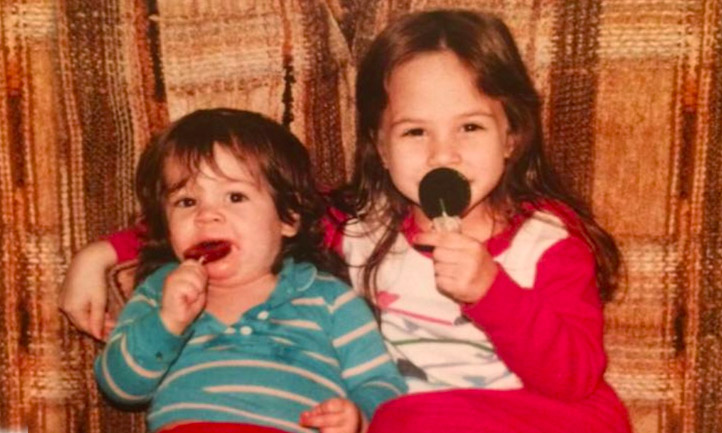How I learned to confront my despair and rededicate my life
Author: Nicole Langhorst
September is National Suicide Prevention Month. This article is the first of five stories by TAPS suicide loss survivors who wish to share lessons learned from their grief journeys. We invite you to share this story using the hashtag #SurvivorSunday. If you know or someone you know is struggling with thoughts of suicide, please call the National Suicide Prevention Lifeline 24/7 at 800-273-8255.
I was a lost soul after my little sister, Michelle, died by suicide. Michelle’s death was indescribable. The pain insurmountable, ravaging me like nothing I had ever felt before. Minutes felt like days and days like years. All I could think about was Michelle and how I did not save her. I hadn’t lived up to my title of “big sister.” It was my job to protect her, and I had failed miserably.
 Photo courtesy of Nicole Langhorst
Photo courtesy of Nicole Langhorst
Like many suicide loss survivors, I feverishly replayed the moments leading up to Michelle’s death. I tried to piece together what I could have done differently. What should my role have been in that split second when Michelle took her own life? Had I utterly abdicated my duties as a sibling? Maybe it went all the way back to our childhood, the time I wouldn’t let her choose the toy she wanted to play with. Then again, maybe it wasn’t my fault at all. Was it the war? The proud Army staff sergeant and combat vet suffering in ways those who loved her just couldn’t understand? Was it mental illness? Was it a relationship? Was it because she was gay? For years, I asked these questions, never finding the answers I so desperately wanted. I guess I just needed to place the blame on something or someone for her death, just so it made sense.
Meanwhile, this horrific tragedy was made worse by the fact that Michelle had died in public. I couldn’t grieve privately. It just was not an option. The media hounded me for weeks for the story—evidently not to shed light on a crucial topic of our times, and certainly not out of concern for me and my family, but instead to sensationalize Michelle’s death for ratings.
All of this prodding and searching was extremely taxing on my own mental health, my body, and my spirit. I didn’t recognize myself in the mirror. Grief was stealing my identity. My world had been turned upside down, and I was headed straight for rock bottom. A mix of prescription drugs, alcohol abuse, and eating became crutches, ways to numb the deep pain and agony I was experiencing. My life was spiraling out of control. I urgently needed help.
Thankfully, I had been in therapy prior to my Michelle’s death, and I decided that I could trust my therapist to help me through my grief. It turns out that reaching out for help was a critical step in my grief journey. The hardest part was just mustering the courage to surrender and go through with it. I began going twice a week for really intense grief work. It was incredibly hard to be that vulnerable, but it was necessary for my personal recovery. Every session, without fail, tears would stream down my face as I faced reality head on. Therapy revealed two things to me: First, it fostered a spiritual awakening within me, and second it spurred me to get healthy again. God and exercise. My soul and my body.
So I got going. I began by learning everything I could about suicide, important for me since my only connection with it to that point had been very personal and very debilitating. The more I immersed myself in research on the topic, the more I felt a need to change the trajectory of my life. I quit my job and enrolled in an undergraduate psychology program. I developed a hunger inside me to help others new in their grief. I discovered it was a way to honor my sister’s life and also to be a servant for God. Running and weight training, too, became a healthy coping tool that allowed me to channel my sorrow. Before I knew it, I was signing up for races to challenge myself.
Throughout all of this, I lost friends, lifelong friends who had promised to be there for me but later disappeared. (This is a fact of suicide loss that most survivors know all too well). I didn’t blame them. This is tough stuff. Life happens, and everyone struggles in one way or another. So I had to create a new circle of friends for support. One of the enduring gifts Michelle left to me was the most fantastic group of friends that I get to do life with now. And for that I will be forever grateful to my sister.
In fact, when I think about it, Michelle’s death has given me a whole new life, one that I can be proud of, one that allows me to make a small mark on the world in her memory. This might be a difficult concept for some to understand but it’s my truth. Every day, I thank God for my problems. The happiest people on Earth are the ones who have discovered the possibilities for growth that loss brings.
Nicole Langhorst is the surviving sibling of Army Staff Sergeant Michelle Langhorst and serves on the TAPS Survivor Care Team.
